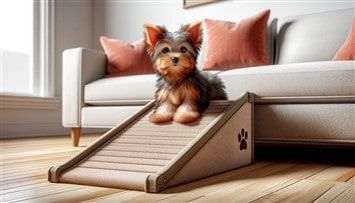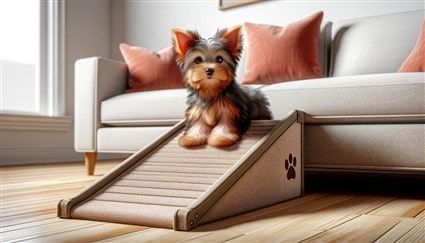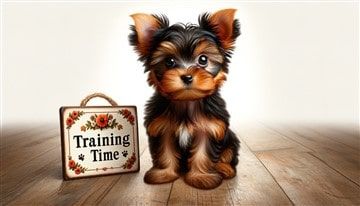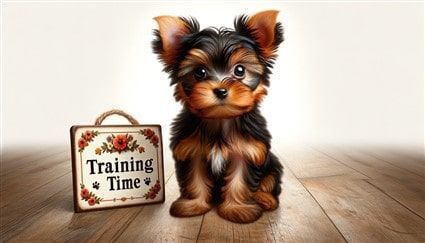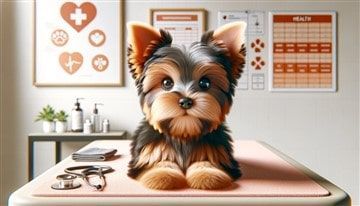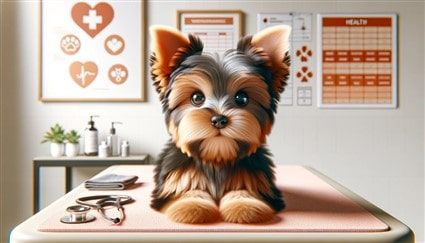Yorkshire Terrier Puppy Care
This is the main page for Yorkie puppy care, which covers the top 10 care tips and FAQ.
For additional information, including specifics on puppy teething, growth charts and more, see our 'Related Articles' down below.
Overview
Caring for a Yorkshire Terrier puppy involves a comprehensive approach that goes beyond mere love and attention. These tiny, energetic bundles of joy have specific needs that, when properly met, make certain they grow up into healthy, happy, and well-adjusted adult dogs.
The care you provide in their formative weeks and months lays the foundation for their physical health, emotional well-being, and behavior throughout their lives. Keeping this in mind, let's dive into the top 10 tips for Yorkshire Terrier puppy care.
Please note: YorkieInfoCenter is reader-supported, and some of the product suggestions on this page are affiliate links. As an Amazon Associate we earn from qualifying purchases. This is at no extra cost to you and helps us continue providing free, high-quality information.
Tip #1: Always Use a Harness for Walks
Once your puppy has had all of their puppy shots, it'll be time to explore outside, taking daily walks and engaging in outdoor activities. But before you do, be sure you have the right accessories, which includes a harness vest, not a collar.
Yorkshire Terriers, like many toy breeds, are susceptible to tracheal collapse, a condition that undermines their breathing and overall well-being. This problem, stemming from weakened tracheal rings, is aggravated by collar use, which exerts direct pressure on the neck during walks or when a dog pulls while on a leash. Choosing a harness over a collar can alleviate this risk, as it spreads pressure across the chest, shoulders, and back, minimizing the likelihood of tracheal issues and promoting a safer, more comfortable walking experience for your puppy.
A step-in harness, in particular, is recommend, as these are designed for ease of use, making the process of getting ready for walks quick and stress-free. This design is especially beneficial for small dogs, who may be anxious or resistant to having objects pulled over their heads or limbs manipulated.
A harness is also excellent for enhanced control during walks, which is important for training purposes and ensuring your puppy's safety in certain situations. In crowded areas or near busy streets, the ability to quickly and safely reel your puppy toward you without causing harm to their neck is invaluable. A harness that works well for tiny Yorkie puppies is the EcoBark Step-in Harness; it starts at size triple-small and fits pups in the 2-lb. range an sizes go up from there.
Tip #2: Offer Early Socialization
Early socialization is essential for raising a well-adjusted and confident Yorkshire Terrier, focusing on introducing them to a broad spectrum of people, animals, situations, and environments. You can begin as soon as the full rounds of puppy vaccinations are complete (usually by the age of 16 weeks).
Begin socialization in the safety of your home by exposing your puppy to various sounds, textures and household items, and ensuring they're comfortable with touch, especially on their paws, mouth, and ears. Slowly introduce them to people of all ages to build positive associations and prevent fearfulness, and, with your vet's approval, start socializing them with friendly, vaccinated dogs and other pets.
Extend your Yorkie puppy's learning by taking them to different environments using a harness and leash, such as parks and pet-friendly stores, and employ positive reinforcement to encourage exploratory behavior. Puppy classes are excellent for further socialization, providing a structured setting for interaction with other dogs and people. Consistency and patience are paramount; ensure each new experience is positive and do not rush the process, allowing your puppy's confidence to grow naturally over time.
Tip #3: Prevent Jumping from High Places
Preventing Yorkshire Terriers from jumping from high places is important. Small breeds are particularly vulnerable to injuries from jumping due to their small size and the proportionally greater impact forces on their joints and bones when they land. This risk is compounded in puppies whose small bones and joints are still developing and can be easily damaged.
High-impact jumping can lead to injuries such as fractures, dislocations, and developmental joint issues that can lead to long-term health problems including arthritis or patellar luxation, conditions that are known to affect small breeds disproportionately. The most common places that Yorkie puppies jump down from are sofas, chairs, and their human's bed. If you place your Yorkie up on furniture like this, be sure to supervise them very closely.
Another option is using pet stairs or ramps like the Sweetbin Adjustable Pet Ramp to provide safe access to higher areas to mitigate jumping risks. These aids are especially beneficial for puppies, who are more vulnerable due to their developing bones and joints, and for older dogs, who may suffer from arthritis or other age-related conditions.
Tip #4: Puppy-Proof the House
Puppy-proofing your home is an essential step creating a safe and welcoming environment for your little guy or gal. Yorkshire Terriers are known for their boundless energy and insatiable curiosity, which can lead them into potentially dangerous situations within your home.
To safeguard your tiny explorer, secure electrical cords out of reach or cover them with protective casings to prevent chewing, which can lead to electrical shocks. Additionally, many common houseplants are toxic to canines, so removing these or placing them well out of your Yorkie's reach is critical. Everyday items such as small toys, batteries, and household items that pose choking hazards should be diligently cleared from areas accessible to your puppy.
Creating a safe zone specifically for your Yorkie can also be highly beneficial. This area can be equipped with safe toys, a comfortable bed, and access to water, allowing your puppy to have a designated spot to play and rest safely when you cannot directly supervise them. For this, we recommend an indoor canine playpen. We like the North States 4 Panel Pet Passage Pen, since this is a great size for a new puppy and it can be expanded with add-on panels as a Yorkie grows.
In the early days, monitoring your Yorkshire Terrier closely as they explore their new surroundings will help you identify potential hazards you may have overlooked initially. Remember, puppy-proofing aims not only to protect your Yorkshire Terrier from harm but also to give you peace of mind, knowing your home is a secure place for your puppy to grow and thrive.
Tip #5: Get Ready for the Teething Phase
Getting ready for the teething stage in Yorkshire Terrier puppies is an essential part of puppy care that new pet parents should prepare for in advance. This period typically begins around the age of 3 to 4 months and can last until they are about 7 to 8 months old, as the pup transitions from having their puppy teeth to their adult set.
Initially, a Yorkshire Terrier puppy will have 28 deciduous (baby or milk) teeth, which are eventually replaced by 42 adult teeth. During this time, your puppy may experience discomfort or itching, leading to an increased urge to chew on anything they can find to soothe their gums.
To prevent your household items from being chewed on, provide plenty of appropriate safe teething toys that are designed to withstand their persistent gnawing. Toys have little nubs can feel good on itchy gums and those that can be frozen can provide relief for swollen gums. A set that we like is the Petstages Mini Dental Chew Starter Pack, which is a set of 3 different toys, that are designed for the fabric pieces to be wet and then frozen, making them ideal.
Tip #6: Start Training Early.
Yorkshire Terriers may be small, but they come with big personalities and a certain level of stubbornness that can pose a challenge during training sessions. Initiating obedience training during puppyhood is wise, as it instills good manners and helps to curb any potential problematic behaviors. Take the time to teach the basics of 'sit', 'come' and 'down'.
It's important to leverage positive reinforcement techniques to reward your Yorkie with treats, praise, and play for displaying desired behaviors. This approach encourages cooperation and strengthens the bond between you and your puppy, ensuring they grow into well-mannered and sociable dogs.
House training is another critical aspect of early training that should not be overlooked. Yorkshire Terriers, like many small breeds, can sometimes be difficult to properly housebreak, but with consistency and patience, they can learn quickly. Establish a regular schedule that you follow for feeding and potty breaks to help your puppy develop a routine. Praise and reward your Yorkie immediately after they go potty in the correct spot to reinforce these good habits.
Tip #7: Follow Puppy Feeding Guidelines
Young puppies should have continuous access to food to help prevent hypoglycemia, or low blood sugar (a common concern in toy breeds). This constant availability ensures they receive the necessary nutrients to support their rapid growth and safeguards against the symptoms associated with this condition, such as lethargy, weakness, and, in severe cases, seizures.
As puppies mature, around the age of 4 months, transitioning them to a structured feeding schedule of three meals a day with plenty of healthy snacks in between is advisable. This adjustment supports their developmental needs while establishing a routine.
Puppies should be given dry kibble, as it is beneficial for dental health, helping to clean teeth and reduce tartar buildup. When selecting kibble, snacks, and treats for your Yorkshire Terrier, it's vital to choose foods made in the USA, where quality control standards are typically more stringent. Look for brands without artificial additives, coloring, food dyes, or chemical preservatives, as these can lead to various adverse effects, including digestive issues and allergic reactions. In some cases, they may even contribute to more severe health conditions.
A kibble that we are impressed with is Wellness CORE Grain-free Small Breed Puppy Formula; this made-in-the-USA recipe has a base of turkey and salmon, notably with peas, flaxseed, spinach, broccoli, carrots, apples and blueberries. It is 100% all natural, with spearmint, rosemary and other herbs as preservatives. This is also formulated with no by-products or fillers at all. And this is designed for high-energy breeds like the Yorkshire Terrier.
Tip #8: Perform Grooming and Dental Care
Grooming a Yorkshire Terrier puppy requires special attention due to their delicate coat and sensitive skin. It's recommended to bathe your Yorkie puppy once every three weeks to keep their skin and coat clean and healthy. When bathing, use a gentle shampoo designed for dogs with sensitive skin to avoid irritation and dryness.
In addition to regular baths, routine face cleaning keeps the face free of food debris and the eye area clean from rheum (eye sleep), while body touch-up cleaning with grooming wipes can help maintain hygiene between baths.
For daily grooming, use a soft bristle brush to gently go over the body, keeping the coat smooth and distributing natural skin oils. Clean the ear flaps once a week to remove debris and excess wax, which can help prevent ear infections.
Dental care is also important for Yorkie puppies. Even though they'll lose their milk teeth, starting a dental routine early is key to avoiding common issues like tooth decay and gum disease. Using brushes, sprays, or wipes for regular cleaning can prevent dental problems. Early dental care keeps their mouth healthy and gets them used to the routine, making future care easier and preventing discomfort and more serious health issues.
Tip #9: Provide Daily Exercise, but With Caution
Providing daily exercise for Yorkie puppies is crucial for their physical and mental health. Engaging in two daily walks, each lasting about 20 minutes, is advisable after they have received all their puppy vaccinations. This routine helps support their development, ensures proper digestion, promotes a healthy appetite and offers mental stimulation to prevent boredom and behavioral issues.
In addition to walks, you can engage your puppy in games like fetch, with small toys; this is great to work the muscles and help strengthen your bond with your little guy or gal.
At the same time, it's important to note that excessive exercise should be avoided, especially before a puppy reaches 10 months old. Their skeletal systems are still developing, and excessive physical activity that strains a pup's body can lead to joint problems. Therefore, while daily walks and playful games for exercise are encouraged, this should be appropriately tailored to a puppy's age and physical capacity.
Tip #10: Keep Up with Veterinary Wellness Check-ups
Keeping up with veterinary wellness check-ups is an important part of care, directly relating to your Yorkie puppy's health and well-being. Regular visits to the vet provide an opportunity for early detection and prevention of possible health issues.
During these check-ups, your puppy will undergo a thorough physical examination, including a weight check, heart and lung function, and examining their eyes, ears, and coat for any signs of concern. Vaccinations are also administered according to the puppy's age and the vet's recommended schedule. These visits are about preventative care and offer a chance to discuss nutrition, behavior, and any questions about caring for your puppy.
These appointments also allow the vet to track the puppy's growth curve, ensuring they develop appropriately. Parasite control, including fleas, ticks, and worms treatment, is also managed during these visits.
To Summarize:
Since we covered a lot so far, let's have a brief summary of the most vital care tips for Yorkie pups:
- Always use a harness when out on walks
- Offer early socialization
- Prevent jumping from high places
- Puppy-proof the house
- Get ready for the teething phase
- Start training early
- Follow puppy feeding guidelines
- Perform proper grooming and dental care
- Provide daily exercise, but with caution
- Keep up with veterinary wellness check-ups
FAQ About Yorkshire Terrier Puppies
If you've welcomed a new Yorkie puppy into your home, you likely have numerous inquiries beyond our top 10 tips. Here's a roundup of the most frequently asked questions.
How much does a Yorkshire Terrier puppy sleep?
Yorkshire Terrier puppies need a significant amount of sleep, typically between 16 to 22 hours a day, to support their rapid growth and development. This sleeping pattern is normal for puppies and crucial for their health, allowing for essential brain development and energy conservation for growth spurts. Ensure they have a comfortable, quiet place to rest undisturbed.
Can my Yorkie puppy sleep with me in my bed?
Allowing your Yorkie puppy to sleep in your bed can be tempting, but it's recommended to wait until they are older and fully house-trained to prevent accidents. Early on, establishing a separate sleeping area like a cozy bed within a canine playpen can help set boundaries and aid in their training process. It also reduces the risk of unintentional injury to the puppy while you sleep.
How big will my Yorkie puppy be?
Yorkshire Terriers are a small toy breed. Though the breed standard calls out for adults to be no more than 7 lbs., most pet Yorkies will be under 10 lbs.
When will my Yorkshire Terrier puppy's coat change color?
Yorkie puppies often experience a change in coat color as they mature, usually starting around six months and can continue until they are about a year old. This color transition from black and gold to blue and tan is a normal part of their development, with their adult coat color becoming more pronounced over time.
Why does my Yorkie puppy have bad breath?
Bad breath in Yorkie puppies is commonly associated with the teething process, and is often due to a mix of blood and saliva, present as new teeth emerge and old ones fall out. It's important to maintain good dental hygiene from an early age, including regular brushing and check-ups. Providing appropriate chew toys can also help keep their teeth clean and reduce bad breath.
Should I crate train my Yorkie puppy?
Instead of crate training, we recommend an indoor canine playpen for Yorkies. This provides them with more space to move around, reducing feelings of claustrophobia, and is equally effective in
managing separation anxiety and containing them safely when unsupervised.
Why is my Yorkie puppy licking me so much?
Yorkie puppies often lick their humans as a sign of affection or to seek attention. Licking is also a way for them to explore their environment or to show submission. If excessive, it's essential to ensure they are not licking due to a health issue and to gently discourage the behavior if it becomes bothersome.
How much food should I feed my Yorkshire Terrier puppy?
A Yorkshire Terrier puppy's diet should consist of about 1/4 to 1/2 cup of high-quality dry food, divided into three to four meals throughout the day. Their exact food requirement depends on their age, size, and activity level. Follow the feeding instructions on the kibble's label, which is usually based on weight.
How do I get my Yorkie puppy to walk on a leash?
Introduce your Yorkie puppy to a leash and harness gradually, allowing them to wear it around the house to become comfortable. Start with short, positive walks, rewarding calm behavior and progress with treats and praise. Patience and consistent training are key to successful leash walking.
Why is my Yorkshire Terrier puppy so shy?
Shyness in Yorkie puppies is often something that is outgrown, but can stem from a lack of socialization or genetics. Introduce them to new situations, people, and pets in a positive, controlled environment to help build their confidence. Consistent, gentle exposure to various experiences is crucial for overcoming shyness.
How do I teach my Yorkie puppy to come when I call their name?
Training your Yorkie to come when called begins in an environment free from distractions. Call your Yorkie's name in an upbeat tone, and immediately reward them with treats and affection upon compliance. As they start responding consistently, introduce more distractions to enhance their focus and obedience. The key to success lies in regular practice and using positive reinforcement to encourage their behavior.
Yorkshire Terrier Puppy Teething - This article covers all the details of this challenging phase and offers helpful tips to guide your Yorkie toward proper teething toys to provide relief for itchy and painful gums.
Why is my Yorkshire Terrier Puppy Shaking - It's not uncommon for young puppies to shake or tremble. There are several possible reasons for this and most can be resolved rather quickly.
List of Supplies for a Yorkshire Terrier - This is a great summary of all the necessary care items for optional health, comfort, safety and well-being. For Yorkies of all ages.
Yorkshire Terrier Puppy Growth Chart - While there is no exact science to know how big a Yorkie pup will grow to be, this is our formula for a good estimate.
More Articles:
Yorkshire Terrier Do and Don't List - A super-helpful concise guide on the most important do's and the most vital don'ts for this amazing toy breed. How many are you following?
Winter Care for Yorkshire Terriers - The winter season can present several challenges with this toy breed. Read helpful tips to ensure your Yorkie stays warm, comfortable, and content through these colder months.





